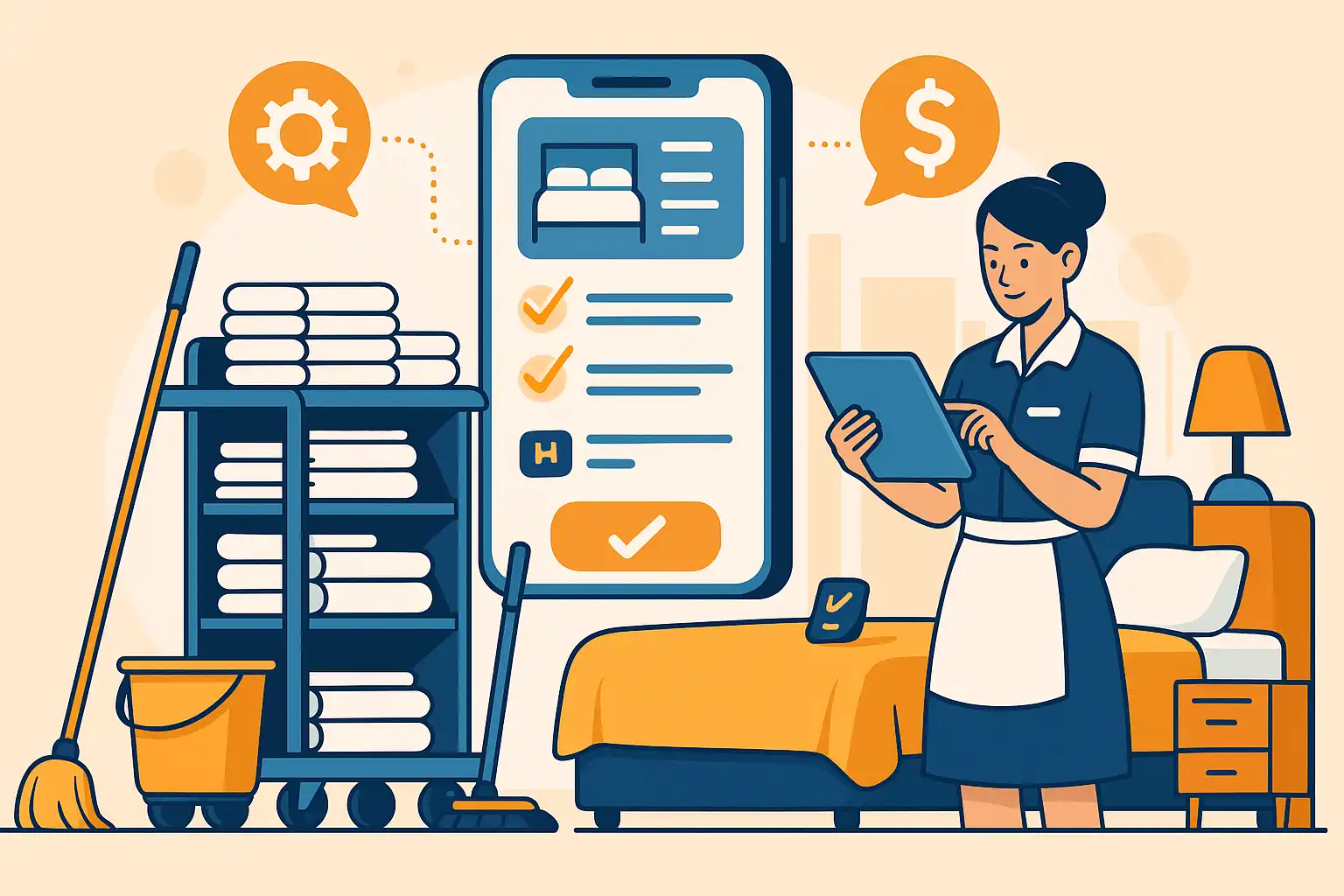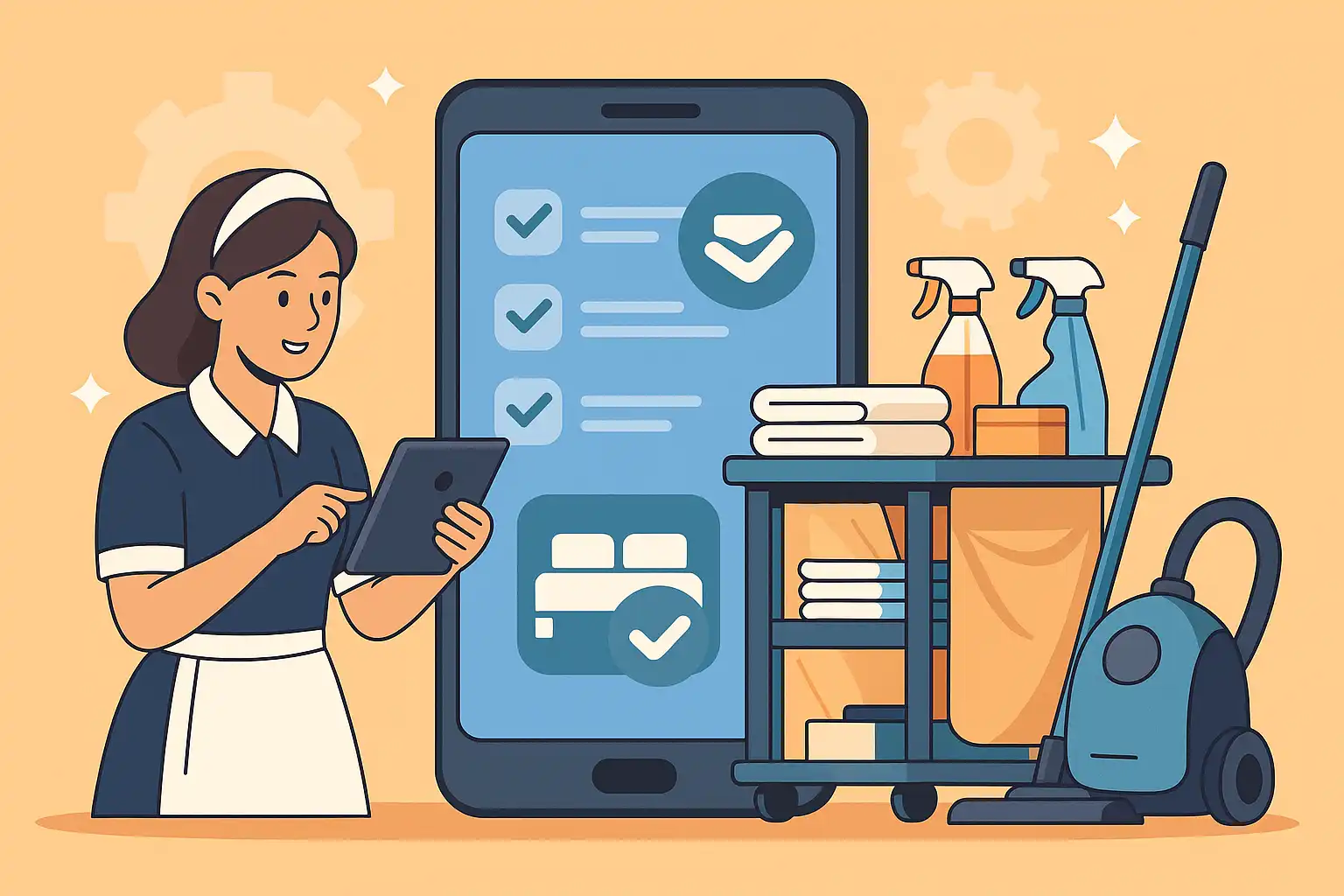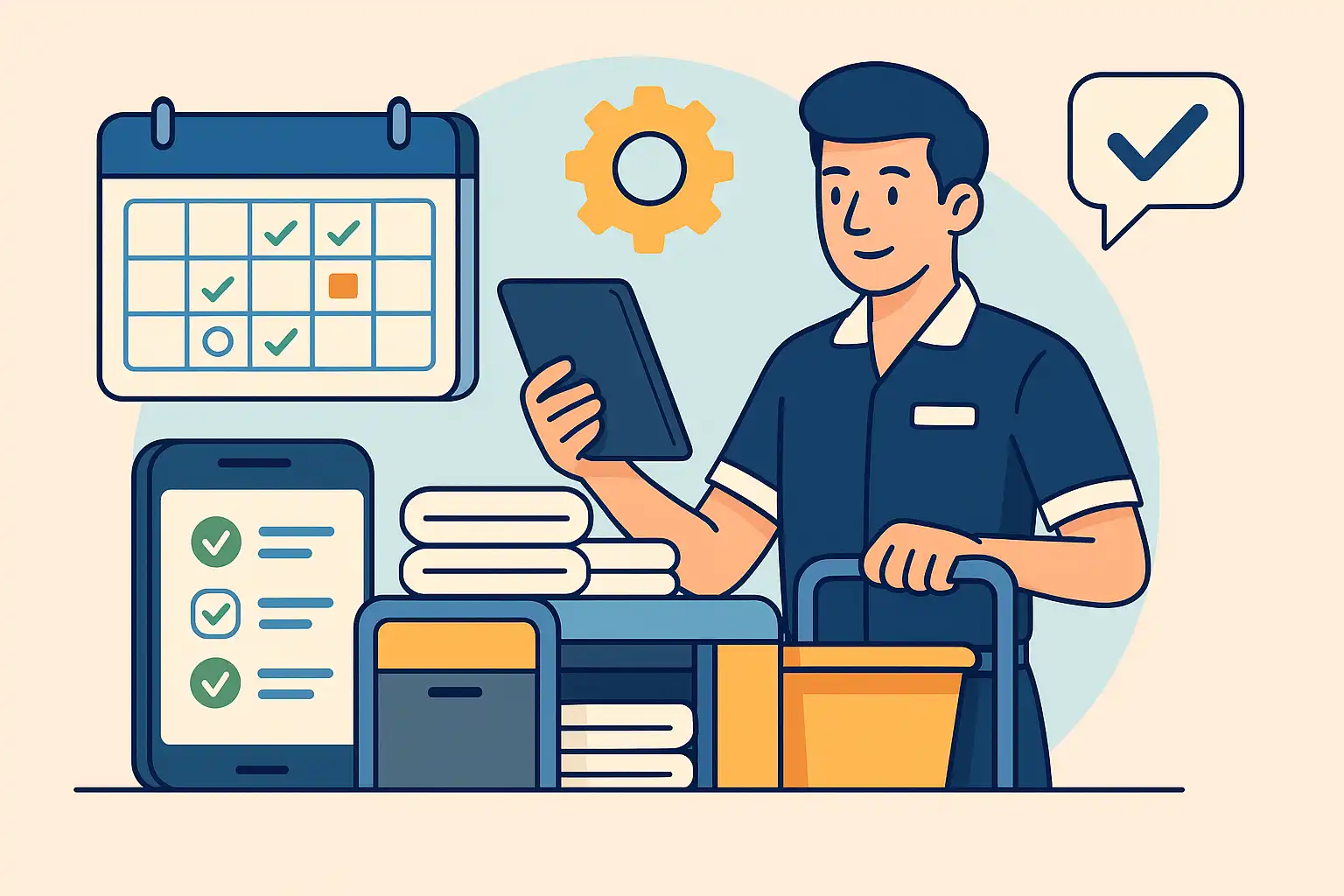Housekeeping Technology: Impact on Hotel Operations and Costs
 Mika Takahashi
Mika Takahashi Mika Takahashi
Mika TakahashiIn today’s fast-paced hospitality world, housekeeping technology has moved from being a nice-to-have to an absolute must-have. With nearly three-quarters of hotels planning to boost their tech investments in housekeeping by 2025, it’s clear that those who don’t keep up risk falling behind—not just in guest satisfaction, but also in operational efficiency and profitability.
Traditionally, the housekeeping department has been one of the most labor-intensive and challenging parts of hotel operations. But thanks to breakthroughs in hotel mobile apps, artificial intelligence, robotics, and IoT integration, housekeeping teams are now working smarter, communicating better, and delivering guest experiences that truly stand out.
This guide dives into how housekeeping technology is transforming hotel operations—from tackling everyday challenges to embracing innovative solutions that deliver real returns. Whether you’re running a cozy boutique hotel or managing a sprawling chain, getting a handle on these tech advancements is key to staying competitive in 2025 and beyond.

Housekeeping technology is essentially a suite of smart tools—both software and hardware—that work together to automate, optimize, and streamline housekeeping operations across hotels. Think of it as a digital ecosystem that includes mobile apps, AI-powered systems, IoT devices, robotics, and cloud-based platforms, all designed to revolutionize traditional housekeeping workflows.
At its heart, housekeeping technology acts like the hotel’s nervous system, connecting housekeeping teams with front desk staff, maintenance crews, and guest services. This seamless integration breaks down communication barriers that have long slowed operations, enabling real-time decisions and quick responses to guest requests.
But housekeeping technology goes far beyond just managing tasks. Today’s systems use predictive analytics to forecast staffing needs, machine learning to optimize room assignments, and IoT sensors to track everything from room occupancy to inventory levels. These tech solutions help housekeeping managers tackle the biggest challenges they face: labor shortages, rising costs, higher guest expectations, and the need for faster room turnovers.
Hotels that have embraced these technologies report impressive results—efficiency gains of 20-30%, sometimes even more in specific areas. It’s not just about swapping paper checklists for digital ones; it’s about rethinking how housekeeping can drive guest satisfaction and boost the hotel’s bottom line.
The hotel industry is under pressure like never before, and these challenges are pushing more properties to adopt housekeeping technology. Here’s why this shift is happening so fast.
One of the biggest headaches for hotel operations today is the labor shortage in housekeeping. Studies show that nearly 70% of hotels are struggling to fill housekeeping roles in 2025, with turnover rates soaring in some places. This means many hotels are running on barebones teams, leading to slower room cleaning, delayed check-ins, and a dip in service quality.
Traditional hiring and retention strategies just aren’t cutting it. Housekeeping is tough, often underpaid, and doesn’t always offer clear career growth. Technology steps in here by making housekeeping jobs more appealing—offering better tools that simplify work, improve communication, and boost job satisfaction. When housekeeping staff have access to modern tech, they tend to be happier and more productive.
Inflation is hitting hotels hard, and housekeeping departments feel the squeeze. Wages have jumped 15-20% in major markets over the last two years, and costs for utilities and cleaning supplies have risen similarly. These expenses are eating into profits, so hotels need smart ways to keep quality high without breaking the bank.
Housekeeping technology helps by automating scheduling to cut overtime, managing inventory to reduce waste, and using energy-saving systems that can slash utility bills by 15-25%. These innovations don’t just save money—they deliver measurable ROI that makes a real difference to the bottom line.
The pandemic changed everything about what guests expect from hotels—especially when it comes to cleanliness and service. Today’s travelers want spotless rooms, transparency about cleaning, quick responses to requests, and seamless service from check-in to check-out. Meeting these demands with old-school methods is tough and costly.
Guests now expect updates on room status in real time, swift fixes for maintenance issues, and personalized touches without having to ask. Managing all this manually is nearly impossible. Housekeeping technology makes it doable by streamlining communication and operations so hotels can not only meet but exceed these expectations.
Maximizing room occupancy means turning rooms around faster than ever. In many markets, check-out to check-in times have shrunk by about 30%, putting intense pressure on housekeeping teams to clean quickly without sacrificing quality.
This means every part of housekeeping—from room attendants to maintenance—has to work efficiently and in sync. Old-fashioned paper logs and slow communication just create bottlenecks. Technology cuts through these delays by automating tasks and enabling instant updates, helping hotels keep rooms ready on time.
One of the most persistent issues in hotel operations is poor communication between housekeeping and other departments. Maintenance requests get overlooked, guest preferences don’t reach room attendants, and front desk staff don’t always know when rooms are ready. These gaps lead to unhappy guests, wasted resources, and lost revenue.
Today’s guests are quick to share their experiences online, so even one communication slip can hurt a hotel’s reputation. Housekeeping technology solves this by creating integrated platforms that keep everyone—from executive housekeepers to maintenance staff—in the loop, ensuring smooth coordination and better guest experiences.

Modern housekeeping relies on several key tech tools that tackle specific challenges while boosting overall efficiency and guest satisfaction. Here’s a look at the essentials.
Mobile apps have become the backbone of housekeeping technology, changing how teams communicate, track tasks, and manage daily work. Instead of paper lists, room attendants get real-time updates on their smartphones or tablets.
These apps allow dynamic task assignments that adjust throughout the day based on guest check-outs, priority requests, and who’s available. That means workloads stay balanced, and managers can quickly adapt to changing needs.
Digital checklists within the apps raise quality control to a new level. Every cleaning task has clear steps, photo verification options, and progress tracking. Room attendants can snap photos to document room conditions, flag maintenance issues, and log completion times—creating accountability and helping managers spot training opportunities.
Instant messaging lets housekeeping staff, front desk teams, and maintenance crews communicate instantly. If a room attendant finds a broken faucet, they can send a photo and description right away, triggering a work order without delay. This real-time communication cuts out the confusion and lag of old paper reports.
Popular platforms like Flexkeeping, HKeeper, and Sweeply are widely used by hotel chains, delivering improvements in communication, task accuracy, and guest satisfaction.
Connecting housekeeping technology with a hotel’s existing PMS is a game-changer. It removes the need for manual data entry and speeds up communication, making room prep and guest service smoother.
When guests check out, the PMS immediately alerts housekeeping via their mobile devices, kicking off cleaning assignments. As rooms get cleaned and inspected, their status updates automatically—from “dirty” to “clean” to “ready”—giving front desk staff real-time info for check-ins.
These instant notifications help minimize vacancy times. Housekeeping teams get details about guest preferences, special requests, and any maintenance issues, so they can prioritize rooms accordingly. VIPs and early arrivals get top attention, maximizing guest satisfaction and revenue.
Most PMS platforms like Opera, Protel, and Fidelio offer seamless integration, meaning hotels can upgrade without disrupting current systems.
AI is the cutting edge of housekeeping tech, bringing smart forecasting, predictive maintenance, and workflow optimization to the table.
AI-driven demand forecasting looks at past occupancy, local events, and seasonal trends to predict staffing needs with impressive accuracy. Hotels using AI report 25-30% better staffing efficiency, cutting overtime and avoiding understaffing.
Predictive maintenance uses IoT sensors and machine learning to spot equipment issues before they become problems. HVAC units, plumbing, and room amenities are monitored constantly, so automatic alerts can prompt timely repairs, avoiding guest complaints and costly emergencies.
AI also helps personalize guest experiences by learning preferences from past stays—adjusting room temperature, amenities, and even dietary needs with minimal extra effort from staff.
Smart scheduling algorithms consider room location, cleaning complexity, staff skills, and guest priorities to assign tasks efficiently. This can reduce overtime by up to 20% and improve cleaning quality.
Housekeeping tech keeps evolving, with exciting innovations reshaping what hotels can do.
Robots have moved from novelty to necessity in many hotels. Automated vacuum robots, like LG’s CLOi series, handle corridor cleaning efficiently, cutting routine cleaning time by up to 40%. This frees staff to focus on guest rooms and personalized service.
UV-C disinfection robots, used by brands like Hilton, provide chemical-free sanitization, giving guests extra peace of mind post-pandemic.
Delivery robots, such as Aloft’s Botlr, transport towels and toiletries autonomously, reducing staff workload and delighting guests with futuristic service.
Though the upfront investment is significant, many hotels see payback within two years through labor savings and better efficiency.
IoT creates smart environments where rooms and equipment communicate automatically.
Sensors track room occupancy, temperature, humidity, and air quality in real time, helping housekeeping focus cleaning where it’s needed most. Rooms that haven’t been used can get lighter cleaning, saving time and resources.
RFID tags on linens and equipment simplify inventory management, cutting losses and ensuring supplies are stocked just right. Hotels report 25% savings on linen replacement thanks to this tech.
Automated supply ordering predicts when to restock cleaning products, preventing shortages and excess inventory.
Energy management systems adjust lighting and climate based on occupancy and cleaning schedules, reducing utility costs by 15-25% without sacrificing comfort.
Voice tech is making housekeeping and guest communication more intuitive.
Housekeeping staff can control room settings hands-free, improving efficiency and hygiene.
Guests can use voice assistants like Alexa or Google Assistant to request services, with requests routed instantly to the right teams. Multilingual support helps overcome language barriers among diverse staff and guests.
Integration ensures voice requests automatically create tasks and work orders, so nothing falls through the cracks.

Hotels adopting housekeeping technology see clear, measurable benefits.
Room cleaning times drop by 20-30% thanks to optimized workflows and digital checklists.
Communication delays between departments shrink by half, speeding up decisions and guest service.
Room inspections become 85% more accurate with photo documentation and standardized checklists.
Daily room capacity can increase by 15% through faster turnovers and better scheduling, boosting revenue without extra resources.
Labor cost savings are the biggest win—some 300-room hotels save $150,000-$300,000 annually by reducing overtime and improving productivity.
Inventory waste drops by 25% with smart tracking and automated ordering.
Maintenance costs fall by 18% due to predictive alerts and proactive repairs.
Energy savings can reach $50,000 per year for mid-size hotels through intelligent climate and lighting controls.
Guest satisfaction scores rise 15-20% as service becomes faster, more accurate, and consistent.
Complaint resolution times drop from 45 to 12 minutes on average, thanks to real-time communication.
Early check-in readiness improves by 60%, delighting guests and building loyalty.
Positive online reviews mentioning cleanliness jump by 35%, strengthening reputation and bookings.
To get the most from housekeeping technology, careful planning and change management are key.
Choose platforms that integrate smoothly with your existing PMS and hotel systems.
Look for user-friendly interfaces that minimize training time but offer powerful features.
Consider scalability to support future growth and multi-property management.
Evaluate total costs, including licenses, hardware, training, and support.
Roll out new tech in phases to reduce disruption and gather feedback.
Invest in ongoing staff training—both technical skills and workflow changes.
Track success with clear metrics like adoption rates, efficiency gains, and user satisfaction.
Use staff feedback to continuously refine and improve systems.
Several top providers offer robust housekeeping technology solutions tailored to different hotel needs:
The future is bright for housekeeping technology, with exciting developments on the horizon.
Augmented Reality (AR) training offers immersive, hands-on learning for new housekeepers, improving skill retention.
Computer vision systems automate room inspections, using AI to detect cleanliness and maintenance issues quickly.
Blockchain enhances supply chain transparency, ensuring cleaning products meet quality and sustainability standards.
5G connectivity enables real-time video monitoring and cloud-based AI processing, boosting operational capabilities.
Green cleaning systems precisely dispense chemicals to reduce waste.
Smart plumbing monitors water use and detects leaks, supporting conservation efforts.
Waste analytics track environmental impact and identify improvement areas.
Carbon footprint reporting helps hotels demonstrate their commitment to sustainability.
Real-world examples show how housekeeping technology delivers results.
If you’re considering upgrading your housekeeping operations, here’s how to begin.
Start by analyzing your current housekeeping processes to pinpoint pain points and opportunities.
Review your existing tech infrastructure to understand integration needs.
Costs vary by property size and system complexity:
Plan for ongoing costs like licenses, support, and training.
Set clear criteria covering features, integration, scalability, support, and total cost.
Request proposals and check references from similar properties.
Visit sites using the tech to see it in action.
Typical rollout takes 3-12 months:
Allow time for change management and system tuning.
Track key metrics like cleaning times, labor costs, guest satisfaction, and staff productivity.
Regular reporting helps maintain momentum and spot areas for improvement.
Embracing housekeeping technology is about empowering your team, enhancing guest experiences, and driving hotel success. The hotels that invest wisely today will be the leaders of tomorrow’s hospitality landscape.